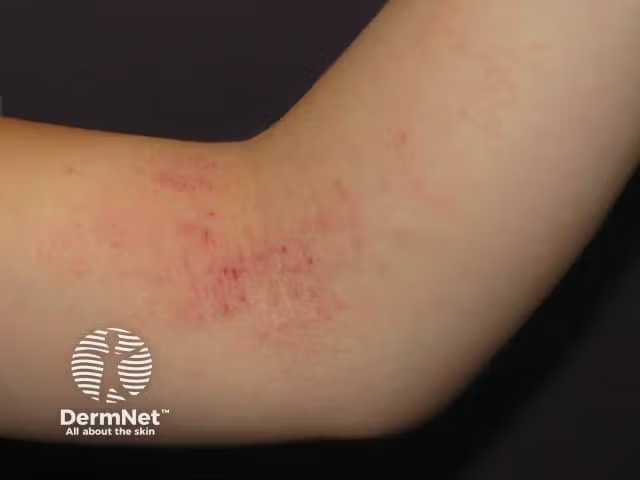- Case-Based Roundtable
- General Dermatology
- Eczema
- Chronic Hand Eczema
- Alopecia
- Aesthetics
- Vitiligo
- COVID-19
- Actinic Keratosis
- Precision Medicine and Biologics
- Rare Disease
- Wound Care
- Rosacea
- Psoriasis
- Psoriatic Arthritis
- Atopic Dermatitis
- Melasma
- NP and PA
- Skin Cancer
- Hidradenitis Suppurativa
- Drug Watch
- Pigmentary Disorders
- Acne
- Pediatric Dermatology
- Practice Management
- Prurigo Nodularis
- Buy-and-Bill
Commentary
Podcast
Derm Dispatch: A Comprehensive Guide to Managing Eczema with Integrative Medicine
Author(s):
In the first Derm Dispatch episode, Renata Block, MMS, PA-C, and Peter Lio, MD, discuss integrative approaches to managing eczema, including the use of holistic treatments.
In the first episode of the new Derm Dispatch series, host Renata Block, MMS, PA-C, a board-certified physician assistant in Chicago, Illinois, and a Dermatology Times Editorial Advisory Board member, and guest Peter Lio, MD, a board-certified dermatologist and clinical assistant professor of dermatology and pediatrics at the Northwestern Feinberg School of Medicine in Chicago, Illinois, discuss integrative approaches to managing eczema, including the use of holistic treatments, and how to incorporate these methods alongside conventional therapies.
Lio, a dermatologist specializing in integrative approaches, emphasizes that good clinical care often naturally incorporates individualized care, blending conventional and holistic methods. One evidence-based approach he highlights is black tea compresses, which help reduce inflammation and itch, offering a simple, cost-effective alternative to bleach baths.
Lio acknowledges that while integrative options such as probiotics and vitamin D supplementation can be beneficial, patient receptivity varies. He tailors recommendations to individual preferences, avoiding overwhelming patients with too many interventions. He also discusses the nuanced role of bleach baths, noting that while they are still guideline-recommended, their mechanism may be more anti-inflammatory than antimicrobial.
Addressing steroid dependency, Lio shares his balanced perspective, recognizing their necessity in certain cases but advocating for safer, long-term alternatives. He also touches on dietary influences, emphasizing that while food triggers are rare, an anti-inflammatory diet, such as the autoimmune protocol diet, may provide some benefit. However, he cautions against unnecessary food elimination, which may increase the risk of true allergies. His patient-centered approach prioritizes evidence-based strategies while respecting individual preferences.
Block and Lio also discuss the hygiene hypothesis, noting that modern lifestyles and exposure to detergents, emulsifiers, and pollutants may negatively impact the skin barrier and microbiome. With probiotics, Lio emphasizes that although evidence is mixed, multi-strain formulations such as Lactobacillus rhamnosus GG show promise, particularly in prevention.
Lio advocates for a holistic strategy, integrating stress management techniques such as hypnotherapy and meditation, recognizing the bidirectional relationship between stress and skin inflammation.
He also shares his excitement about the growth of integrative dermatology, highlighting initiatives such as the Integrative Dermatology Symposium and the "Living Well With Eczema: A Community Workshop" event in Chicago to support education, connection, and personalized care strategies.
“We think it's so important to get these words out there. So many families feel isolated and alone. The magic is when they come together, they get to know each other, they see that they're not alone, and other people are going through the struggle. They share tips and tricks. They meet people. It's really lovely. We do something like this on the national level every year with the Eczema Expo, but this is something a little bit more intimate on a local level. We're hoping if it's a big hit here in Chicago, we're going to do more of these in different parts of the country so people can get something a little bit closer to home,” Lio said.
The “Living Well With Eczema: A Community Workshop” event, hosted by the National Eczema Association on March 22nd, brought together patients, caregivers, and health care providers for a day-long workshop to discuss eczema management strategies. Registration to the event included access to eczema sessions led by experts, educational resource packets, and networking opportunities.
For more news on atopic dermatitis, subscribe to receive Dermatology Times’ eNewsletters and register to attend Revolutionizing Atopic Dermatitis in Nashville, Tennessee, June 6-7.





